Some recent MTSU graduates bring us up to speed on their professional pursuits
Most children pretend to be doctors at one point or another. It’s another thing to become one. Gaining the skills and knowledge it takes to get into medical school involves a great deal of work and preparation. At MTSU, students can take those important first steps toward a career in medicine or toward graduate programs for other professions.
There is no pre-medical major at MTSU. Instead, the University feels strongly that students are better served completing a major of their choice while preparing for medical school or other pre-professional health programs. (MTSU does partner with Meharry Medical College School of Medicine in offering the Medical School Early Accep-tance Program, a seven-year early med school acceptance program that concludes with graduation from Meharry Medical College in Nashville.)
While many students choose to major in a traditional science such as Biology, Chemistry, or Biochemistry, students with interests outside the natural sciences are encouraged to pursue those majors, too. As a result, MTSU pre-medical students major in departments all across campus.
Students on a pre-med track, however, work with advisors in the Pre-Professional Health Science Advising Center to ensure that they are taking the recommended courses and participating in the extracurricular activities needed to be successful on admissions tests, in the applications process, and in medical school.
Innovations magazine caught up with several recent graduates from the College of Basic and Applied Sciences who used their degrees and undergraduate lab opportunities to successfully prepare for the path to becoming a doctor or researcher. With a foundation built at MTSU, they serve as solid proof that students gain the skills and knowledge it takes to be successful in professional or graduate schools, all while benefiting from the one-on-one attention from teachers and counselors.
True Blue!
Kirsten Cunningham
2019, B.S. in Biology and Chemistry
Now at Johns Hopkins School of Medicine
I grew up in Alaska, although I spent my early childhood years in Tennessee. After high school, I didn’t immediately enter college, but took a few years off from school for family reasons. In my early 20s, I moved back to Tennessee to be closer to my oldest sister, who lived in Murfreesboro. She had attended MTSU for her bachelor’s and master’s degrees, so I enrolled at MTSU as well.
I didn’t immediately know I wanted a career in research, but I figured that out during my first semester at MTSU. I was diagnosed with a very rare neurological condition when I was a teenager, and in trying to understand the science behind what was happening to me, I became fascinated by the science itself. There is something magical about taking the seemingly unexplainable microscopic world and making it tangible and knowable.
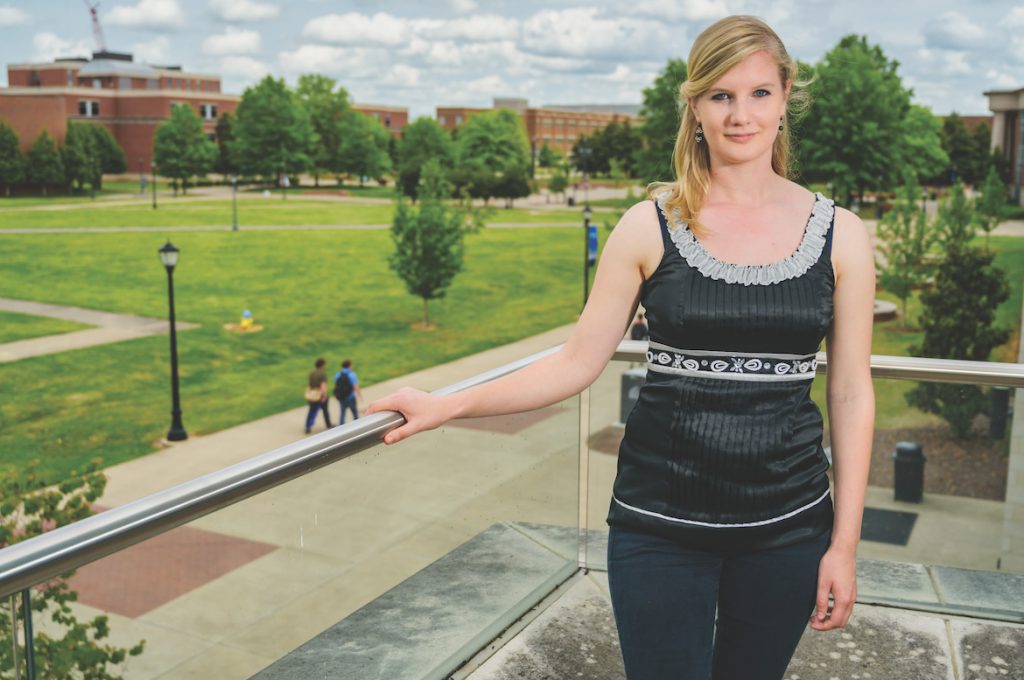
2019 graduate Kirsten Cunningham now studies at the John Hopkins School of Medicine.
MTSU poised me for a strong career in research in two specific ways. First, the science faculty are very engaged with undergraduates and make their labs very accessible to students. As a freshman, I saw the research labs through all the glass walls in the hallways, but did not know I would be able to engage in the research there. My professor for General Biology I, Dr. Grant Gardner, noticed that I was interested in research and took the time to discuss my interests with me and wrote me letters of recommendation to faculty whose research specifically interested me. This is how I ended up researching with Dr. David Nelson, even though I had not taken any classes with him at that time.
I continued to research in the Nelson lab my entire time at MTSU, during semesters and over the summers. In addition to my work in the Nelson lab, I was able to collaborate with other labs (McClelland and Farone), and this led to two publications by the time I was a junior. The publications, networking opportunities at conferences, and research experiences were invaluable in preparing me for my current graduate work at the Johns Hopkins School of Medicine.
The MTSU Honors College and Undergraduate Fellowship Office also took a very active interest in supporting and guiding me during my time as an undergraduate. Because of mentorship and guidance from Dean John Vile and Laura Clippard, I applied for and won multiple national honors and scholarships such as the Barry Goldwater scholarship and a National Science Foundation REU (Research Experiences for Undergraduates) at Scripps Research in La Jolla, California.
These honors not only provided financial support and additional research training, but together with my publications, made for an unstoppable graduate school application.
As for my experience as a whole, I stayed very, very busy. I started as a Biochemistry major but decided during my sophomore year that I wasn’t getting enough molecular biology and doubled my major to Biology and Chemistry. I also worked off campus at Walgreens as a pharmacy technician.
Currently, I am working toward my Ph.D. in Cellular and Molecular Medicine at Johns Hopkins. From my first moments on the Johns Hopkins campus, dating back from interview weekend, I felt a sense of home and belonging. This has only intensified since I’ve been here.
My lab is part of the Sidney Kimmel Comprehensive Cancer Center at Johns Hopkins in the Department of Pathology. My thesis work focuses on developing a gene therapy for pancreatic cancer. Specifically, my work aims to exploit CRISPR-Cas9 technologies as targeted cell-killing tools to search out and destroy cancer cells while leaving healthy cells unharmed. Johns Hopkins is an ideal place to carry out this work, as I am able to study patient samples collected over the past several decades, and I am surrounded by world experts in the field.
In the future, I intend to lead my own lab and continue to be at the cutting edge of cancer research. I feel I can have the most impact on the world by translating basic science discoveries into clinically viable therapies for patients who need them most.
Robert Owen
2019, B.S. in Biology
Now at Mayo Clinic Alix School of Medicine
I was born in the Indianapolis area but relocated to Tennessee in 2003—first to Nashville, then to Franklin, and finally Murfreesboro.
From living in the ’Boro for more than 11 years, the reputation of the University was very prominent and obvious in the community. Also, I had been the head coach of Ultimate Frisbee for 10 years at Blackman High School, and we had had success story after success story of our students going on to matriculate and thrive at MTSU. Many of them were already involved through MTSU’s excellent dual enrollment program for our high school students.
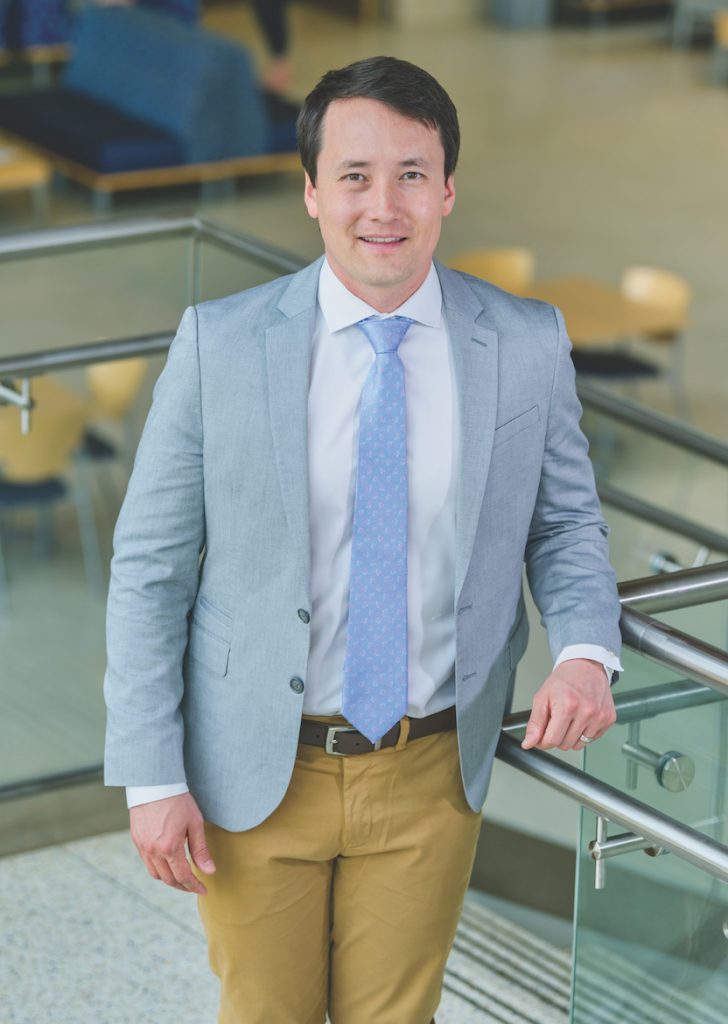
2019 graduate Robert Owen is at the Mayo Clinic Alix School of Medicine.
Additionally, through various volunteer activities in the community, I had developed relationships with members of the Biology Department and University Honors College at MTSU and quickly discovered that they had world-class programs of which I wanted to be a part.
After being a humanitarian and religious international missionary for many years prior, my emerging desire to provide medical care to the underserved of our community and our world providentially intersected with the opportunity that MTSU provided for me when I enrolled in January 2016.
Much of medicine is built upon the foundations of basic science, art, and human touch. Biology, Chemistry, Physics, and the social sciences at MTSU gave me both sure footing for medical school and a significant step ahead with my coursework. Each and every day in my current studies, I am using or referencing some knowledge, notes, or textbooks from MTSU. From understanding the physics behind the electrical and mechanical workings of the heart as well as the gas exchange of the lungs, to understanding the chemistry of the kidneys, blood, and pharmacy, and to the microscopic and genetic world of our cells, my education at MTSU continues to be a solid rock that I build upon every day.
I also learned how to become a scientific and clinical investigator in the scholarly research laboratories at MTSU. The skills and inspiration that I received are now fruitfully producing published research for me here at my medical school.
Furthermore, the Honors College and social sciences gave me the tools to be ahead of the curve as it relates to dealing with things like systemic health care inequities, myriad racial challenges, and cultural barriers with patients. I am forever grateful for my professors who mentored me and inspired me to become the physician I one day hope to become.
Most of the undergrad majors represented in my class here at the Mayo Clinic Alix School of Medicine are Biology or a Biology discipline (I was a Biology major with a Chemistry minor and Honors College minor). Some of the others include things like English, Ethics, Mathematics, Psychology, Engineering, and Computer Science.
I am currently finishing my second of four years of medical school and will sit for my first board exam at the end of this school year. The first two years are primarily didactic training, while the upcoming two years are largely clinic- and hospital-based training. I’m also involved in clinical research in areas such as neurosurgery, COVID-19, and cancer. Once I graduate, I will enter a specialized residency training program. After residency I will find a permanent medical practice.
My life and career aspirations are such that I hope to be able to serve underserved populations both here and abroad.
I’ve received a lot of help from others throughout my life, and I just hope that I can one day somehow pay that back—or better yet, pay it forward.
[Editor’s note: Owen received a national fellowship from Phi Kappa Phi, the nation’s oldest and most selective collegiate honor society, to help pay for his medical school training.]
Joseph Gulizia
2019, B.S. in Animal Science
Now at Auburn University
From 2004 to 2019, I was living in a small, rural town called Fairview. I am a first-generation college student with working class parents. I did not grow up on a farm or around poultry.
When I graduated from high school, I never envisioned having the opportunity to pursue graduate degrees.
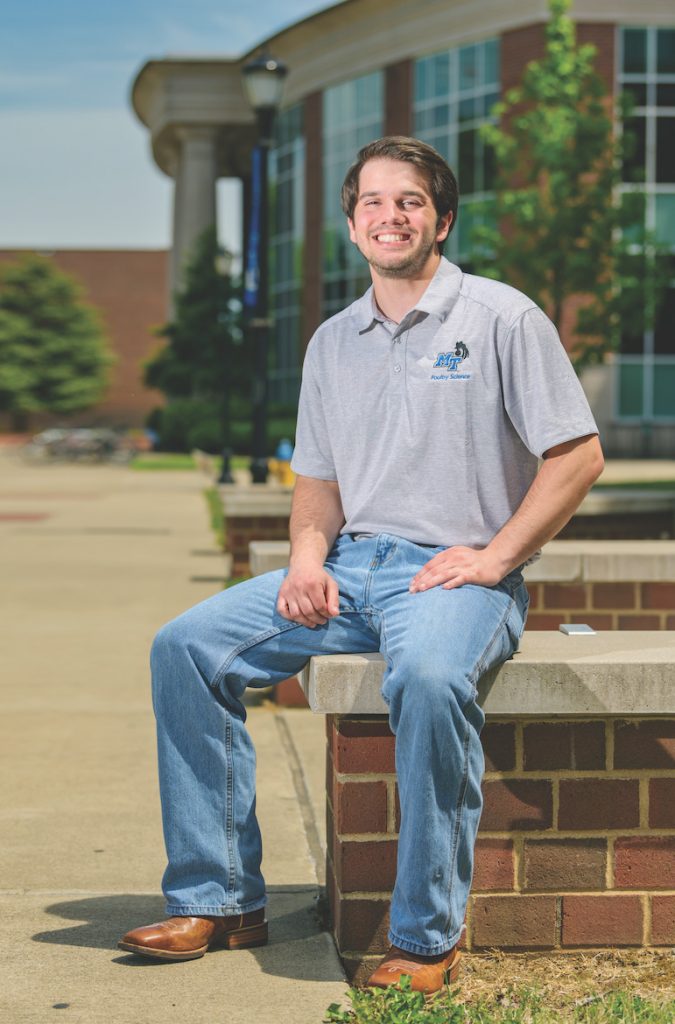
2019 graduate Joseph Gulizia is now a graduate researcher in Auburn University’s poultry science program.
During my time in Tennessee, I was in the inaugural class of the Tennessee Promise program, and I started my academic journey at Columbia State Community College. After completing my associate degree, I was accepted into the Animal Science program at MTSU with courses focused in pre-veterinary medicine.
My attraction to both Columbia State Community College and MTSU was the affordability of education. Financially, I wanted to make the smartest decisions to ensure I could walk away from college with little to no tuition debt.
Throughout high school I really had little career focus, but someone suggested becoming a veterinarian, and I was intrigued. The two years I spent at Columbia State provided me with a basic education but did not help me find my true passion. It wasn’t until I attended MTSU that I discovered my true career focus, poultry science.
This, however, was not a self-made discovery. I received guidance and mentorship of the highest caliber from MTSU’s resident poultry scientist, Dr. Kevin Downs. I took multiple poultry science classes that he taught as well as completed three poultry science research projects during my time at MTSU. Additionally, he continued to mentor and provide me with poultry science information that went beyond class limitations. Poultry topics I have learned stuck with me more than other subjects, which has contributed to my fascination with poultry science and research.
Currently, I am in my third semester of graduate school as a graduate research assistant in the Department of Poultry Science at Auburn University with a projected graduation in December 2021. My current research focuses on supplementing exogenous enzymes in poultry feed to improve animal performance and health.
To determine the inclusion rate of enzymes in poultry feed, it is essential to understand how multiple enzymes interact within the animal’s digestive system. With this information, poultry industry nutritionists can have a clear understanding of beneficial and cost-effective inclusion rates of certain enzymes. Thus, my research will continue to assess how various enzymes interact within meat chickens.
[Editor’s note: Gulizia was one of only 58 recipients of a fellowship from Phi Kappa Phi to help pay for his pursuit of master’s and doctoral degrees in Poultry Science at Auburn. Gulizia said he wants to improve the birds’ nutrition while cutting expenses for farmers. Since feed costs can represent 60%–70% of total broiler production costs, Gulizia’s research could be quite beneficial.]
Claudia Lopez
2019, B.S. in Chemistry
Now at Clemson University
I grew up in Ibague, Colombia, and moved to the United States when I was 18 years old.
I moved to Murfreesboro and started looking for options for school. MTSU was my best option because it had the program I wanted to join (Chemistry) and was here in town. Also, I read good reviews about the Chemistry program, so I joined it.
I decided I wanted to pursue a career in science when I was in my junior year in high school. However, I realized I wanted to continue my graduate studies and do research when I was in my third year as an undergrad. I asked for advice from Dr. Keying Ding and applied to Clemson University. Now, I am a second-year Ph.D. student in Chemistry at Clemson, and my research area is materials/organic chemistry.
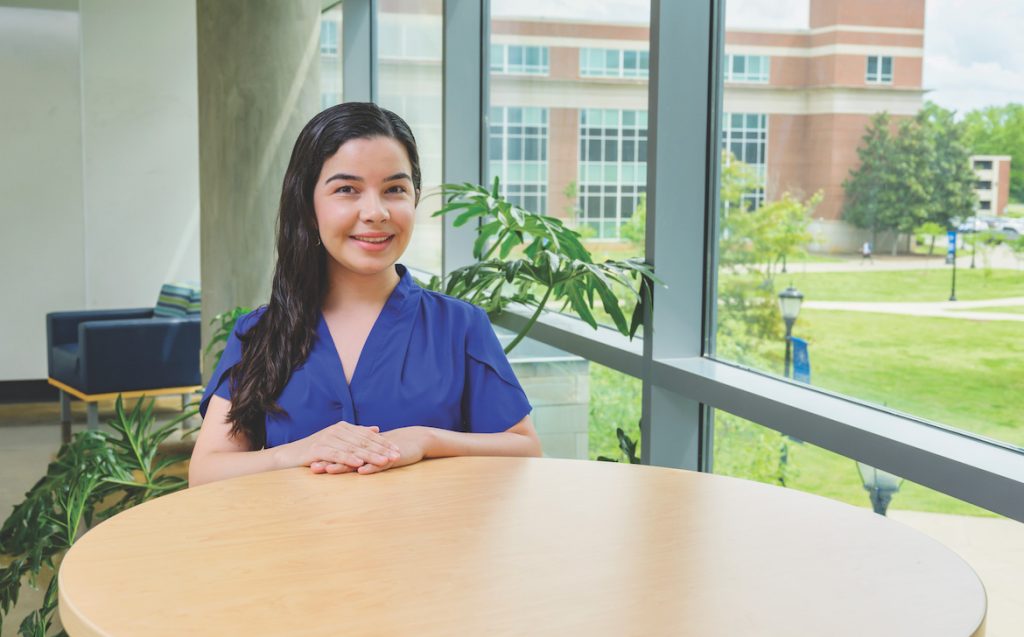
2019 graduate Claudia Lopez is pursuing a Ph.D. in Chemistry at Clemson University.
MTSU was great. I had the opportunity to work in Dr. Ding’s lab. I learned new techniques like nuclear magnetic resonance (NMR) and helped in the synthesis of a ligand in a URECA (Undergraduate Research Experience and Creative Activity) summer project. This work was published in Organic Letters and presented at the Tennessee Experiential Learning Symposium.
Also, in different classes like Quantitative Analysis and Instrumental Analysis, I gained more experience using different instruments and running a lot of samples. All these experiences prepared me a lot for graduate school and for an internship I secured at Eastman Chemical. I was an intern in the corporate analytical group in the summer of 2018 where I did some synthetic work simulating samples that were in the reactors, collected data, and built some models for near infrared (NIR) that helped and were implemented in the quality control labs where they run continuous samples.
I am currently working in Dr. Rhett C. Smith’s lab at Clemson.
My work focuses on using some waste products from the animal industry (like brown grease and some plant oils) and sulfur to make recyclable and durable composites with good mechanical properties that could be potentially used as building materials since they have proved to be resistant to acid and very strong.
Clemson University has allowed me to grow as a professional chemist. I was recently awarded the Call Me Doctor Fellowship. This was an honor for me since it is a fellowship focused on helping minorities such as Hispanic women in science.
I still have two more years left of graduate school, and I think I would like to find a job in industry or academia where I could use my knowledge either helping new students or giving ideas for projects that can be helpful in our society.
Simeon Adebola
2019, M.S. in Engineering Technology
Admitted to the University of California
I grew up in Nigeria. I was born in Lagos and lived in other cities such as Akure, Ile-Ife, Agenebode, and Ibadan due to school, my family moving, and work.
Growing up I was intrigued by knowledge in its various forms and being able to use it to solve problems. I thought of inventors and how they operated—learning everything they needed to know to solve a problem and then solving it. Today, I see that approach in what we know as multidisciplinary research.
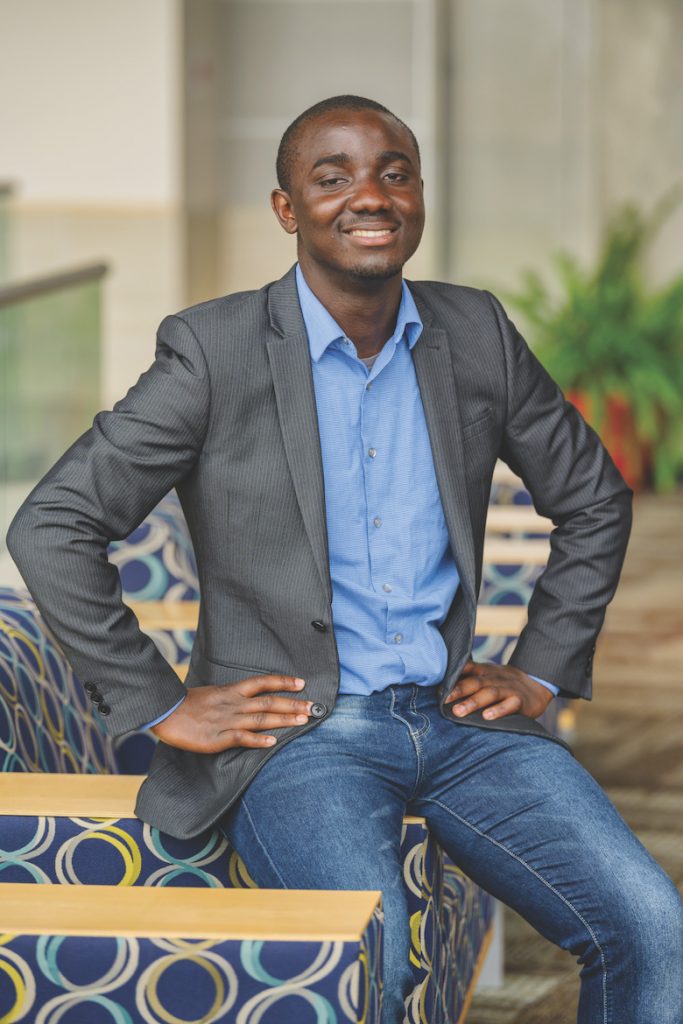
Simeon Adebola, who earned his master’s in Engineering Technology at MTSU, is seeking his doctorate now at the University of California in Berkeley.
I first heard about MTSU from my sister, who was living in Nashville. She encouraged me to apply. Arriving at MTSU, I became excited about the many resources and opportunities. From the James E. Walker Library and its many resources—graduate student carrels/offices, the University Writing Center, college-specific librarians, access to online journals and papers, and interlibrary loan, to name a few—I found a lot was available to me to use in reaching my research goals.
I knew I wanted to go on for a Ph.D., so I was interested in getting into some research and chose the research option for my master’s. I met with faculty members in my field of interest, robotics. I ended up working with Dr. Lei Miao. [That work] greatly expanded my knowledge of robotics and introduced me to areas including computer vision and deep learning.
While reviewing the literature on my thesis topic, I read about an open-source machine learning-based computer vision software (OpenPTrack) used in robotics research. I found out that the research group that created the software was based at UCLA. I got the opportunity to intern with them as part of my curricular practical training (CPT), learning more about computer vision and its applications, testing, and implementing software. I came back after my CPT and applied this knowledge while completing my thesis. This experience gained working on OpenPTrack is what I leverage in my daily work at Vanderbilt.
Instead of beginning my Ph.D. studies in 2019, I started working in a research lab at Vanderbilt University, where I use computer vision and machine learning in research into how children learn through embodied play. The research group I work with designs curriculum and simulations around play activities that cause children to use their bodies and carry out actions as they learn.
My work and research at MTSU introduced me, gave me experience, and paved the way for my position at Vanderbilt University. I also have served as adjunct faculty at MTSU’s Engineering Technology Department for two semesters now.
I applied to some Ph.D. programs for Fall 2021 and was admitted to the University of California’s Electrical Engineering Computer Science and the University of Chicago’s Computer Science doctoral programs. I have accepted UC Berkeley’s offer.
I remain grateful for the role MTSU played in enabling me to achieve my dreams.

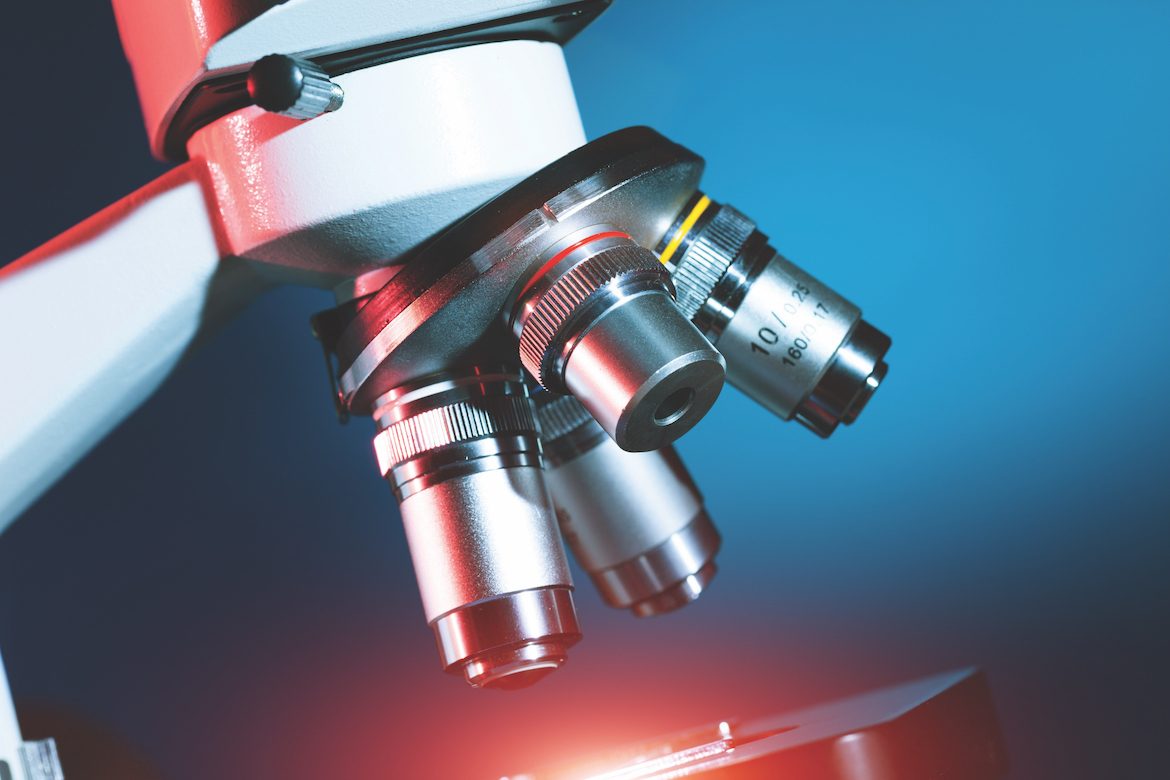
COMMENTS ARE OFF THIS POST